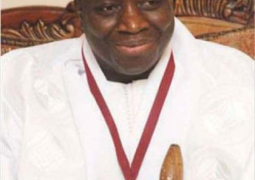The Third Annual Conference and One Hundred and Seventy Second Annual Synod of the Methodist Church The Gambia met at Bethel Methodist Church on Wednesday, Thursday, and Saturday 16, 17, and 19 February 2011, with the Conference Service on Sunday 20 February. It sends you, Mr. President, its greetings and good wishes in the name of our Lord Jesus Christ.
The most notable event of the Conference was the election of a Gambian, the Reverend Hannah Caroline Faal-Heim to succeed Professor The Right Reverend Dr William Peter Stephens as Bishop in 2012. It is especially fitting that the designation of the first Gambian to lead the newly autonomous Church took place on the eve of the celebration of Independence Day itself. The last Gambian to lead the Church was the Reverend Ernest Stafford (from 1983 to 1988) when we were still an Overseas District of the British Church, as we had been for one hundred and eighty eight years until we became autonomous in 2009.
At the Conference we expressed our thanks to Mr. Malcolm Clarke, who completed his term as our first Lay President, and the Reverend Dr Mark Jason, the first Secretary of the Conference, who returns to Britain in the summer. In their place we elected Mr. Samuel H. W. Davis as Lay President and the Reverend Bannie E.F. Manga as Secretary of the Conference.
The Annual Conference met in the week following the launching of the Revised Laws of The Gambia. It is appropriate, therefore, that we have been updating our church laws. We began the process in 2010, and we hope to complete it in an Adjourned Session of the Conference in the summer.
This year is a special year for a second reason. It is the 50th anniversary of our work in Marakissa and the West Coast Region. Fifty years ago Mr Edwards, a Methodist from Banjul, working in Brikama, became aware of the particular needs of Marakissa, especially the prevalence of disease and malnutrition. Two young men (now senior ministers, the Reverend W. Bankole Coker and the Reverend Charles Mendi), Sister Esther Sarre and other Methodists from Banjul began visiting Marakissa. They offered first aid. They improved health by teaching cookery, even bringing car loads of oranges to supplement their diet with Vitamin C. Soon a clinic was opened, then a school, and finally a church – all in the 1960s. What is memorable is that it was an Aku who initiated this work and Akus who pioneered it. This shows the Church as a community which embraces diverse nations and tribes which serve each other and serve the community in which they are set.
In his Episcopal Address Bishop Stephens reflected on our relations with our Sister Churches (Anglican and Catholic), the Muslim Community, and the Government. We give thanks to God for the harmonious relations between Christians and Muslims in The Gambia. We also give thanks for those who under God help to sustain that harmony, not least leaders in the Muslim community and the government itself. In recent years we have seen similar good relations break down in other countries in Africa, Asia, and Europe. So that that will not happen in this land, we recognise the need to have formal as well as informal structures which will safeguard the harmony that we have enjoyed until now.
In discussing relations with government, the Bishop distinguished the role of the Church from that of Christians. Individual Christians will support a variety of political parties. The Church by contrast does not and cannot support any political party. Its role is rather, some would say, that of a critical friend. As a church, we pray regularly for you and the Vice-President and for the members of the government in the high and demanding tasks given to those in authority by God. We recognise that we have not played our full part as churches in constructive dialogue with government on a range of issues. We hope that in future we shall engage constructively with issues of importance to the life of the nation and of each and every one of its citizens. We desire in this way, as in other ways, to be active as churches and as individuals in the life of the country.
For almost two centuries we have made a major contribution to education, which we pioneered for girls as well as boys in the 1820s. We provide education for all ages ranging from nursery school to senior secondary school. From the beginning we have visited the prisons, and at least from the 1840s we have held services in prisons. We saw the importance of agriculture from the beginning and began to import implements in 1821. In the last forty years we have developed a significant agricultural work in Methodist Mission Agricultural Programme (MMAP). From the early years, missionaries provided medicines, but it is in the last fifty years that we have set up five village medical clinics and a dental clinic. In other words we are active in many areas of national life. We intend to continue this good work.
We hope for your support and that of your government, Mr. President, as we seek to develop this work in our service of The Gambia and in gratitude to God, Father, Son, and Holy Spirit.
With our prayers for you and for the nation.
Signed on behalf of the Methodist Church The Gambia
Professor The Right Mr. Samuel H.W. Davis
The Reverend Bannie
Reverend Dr William
Lay President
E.F. Manga
Peter Stephens
Secretary of Conference Bishop


